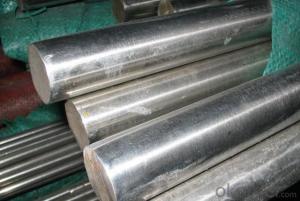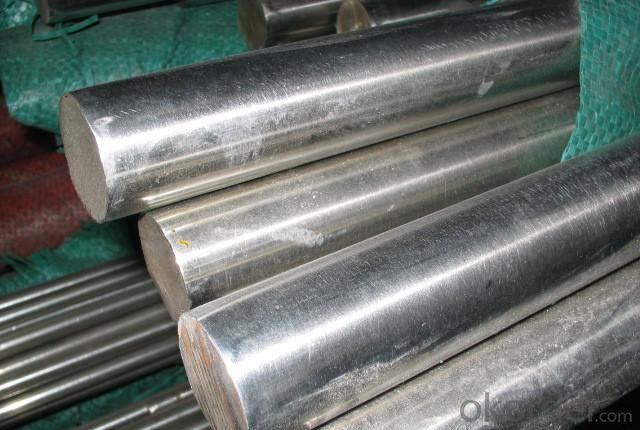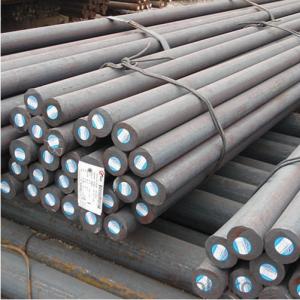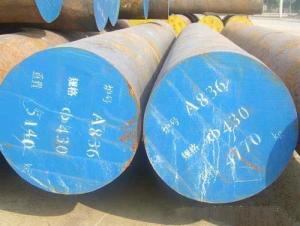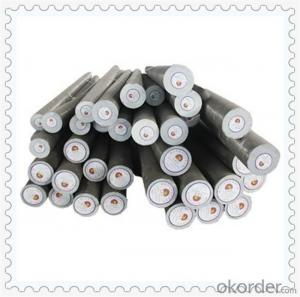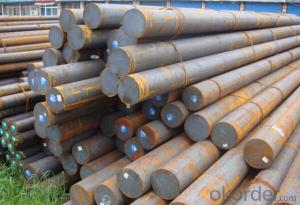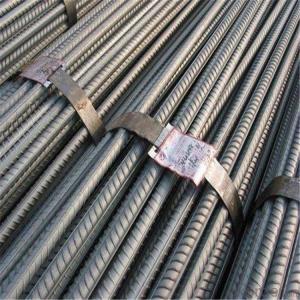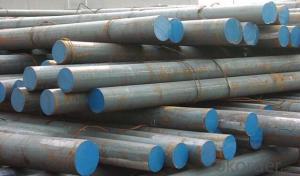Alloy Steel SCM435 Bar Made In China
- Loading Port:
- Tianjin
- Payment Terms:
- TT OR LC
- Min Order Qty:
- 25 m.t.
- Supply Capability:
- 50000 m.t./month
OKorder Service Pledge
OKorder Financial Service
You Might Also Like
Specification
Alloy Steel SCM435 Bar Made In China
Product description:
1. Produce Standard: GB, AISI, ASTM, SAE, EN, BS, DIN, JIS
2. Produce processes: Smelt Iron -EAF smelt Billet - ESR smelt Billet -Hot rolled or forged get the steel round bar and plate
3. Heat treatment: Normalized / Annealed / Quenched+Tempered
4. Quality assurance: All order we can received third party inspection, You can let SGS, BV,.. and others test company test and inspect our products before Goods shipping.
Chemical Composition(%):
C | Si | Mn | Cr | Mo | Ni | P | S |
0.32-0.40 | 0.20-0.40 | 0.40-0.70 | 0.80-1.10 | 0.15-0.25 | ≤0.30 | ≤0.035 | ≤0.035 |
Applications:
35CrMo(A30352)/4135/SCM435/34CrMo4(1.7220) alloy structural steel
35CrMo(A30352)/4135/SCM435/34CrMo4(1.7220) alloy structural steel is used to be manufactured all kinds of important parts which can bear impact, crankle, high heavy load, such as the herringbone gear of the rolling machine, bent roller, plumbing bar, connecting rod, fasteners, spindle of the steamer engine, axle, driving parts of engine, large motor reel, perforator of the oil machinery, boiler bolt whose working temperature is below 400°C, nut whose working temperature is below 510°C, conduit of the high-pressure seamless thick wall in the chemical machinery, etc.
Advantages:
1) ISO9001:2008 certified company.
2) Quality & Quantity Assurance with competitive prices.
3) Delivery & dealings as per Commitment.
4) Highly experience qualified production and sales team.
5) Your satisfaction is guaranteed according your demand.
Product Show:
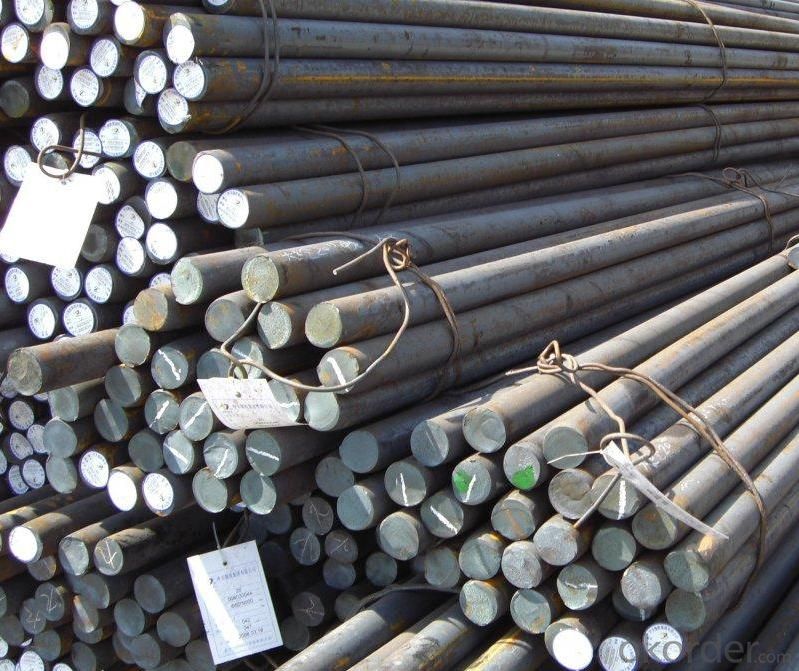
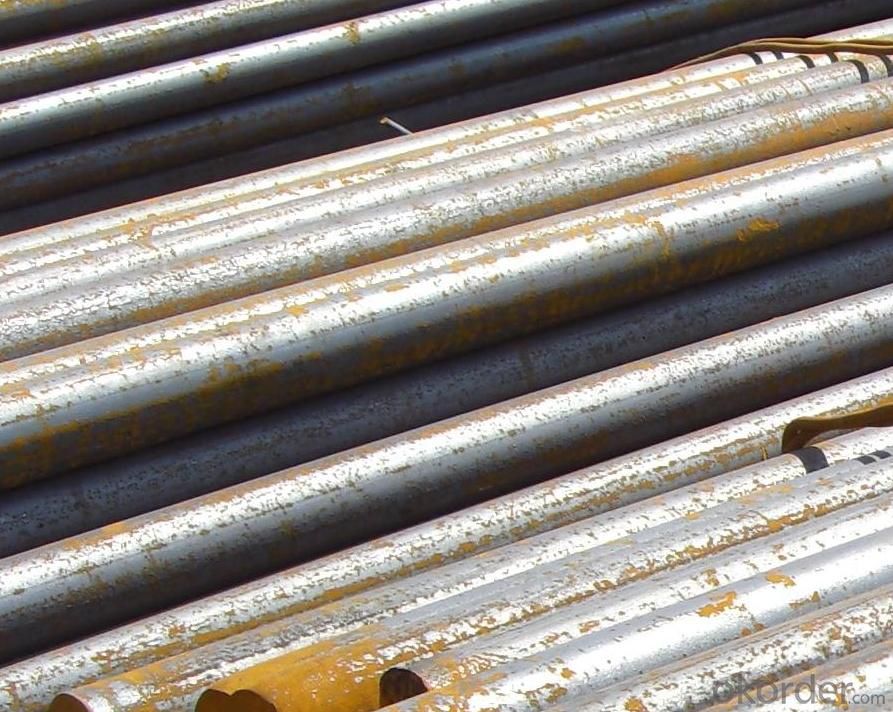
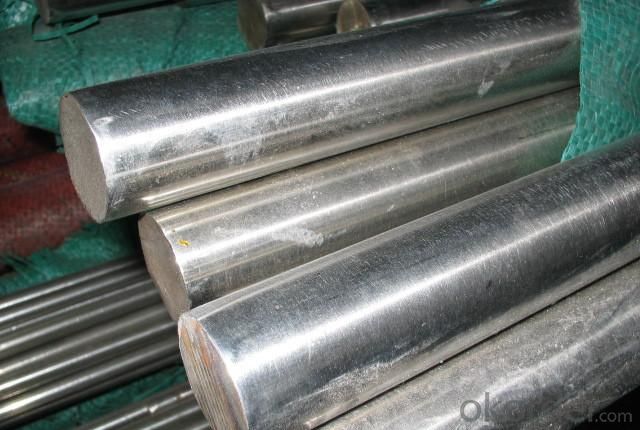
- Q: Can special steel be used in the furniture manufacturing industry?
- Yes, special steel can be used in the furniture manufacturing industry. Special steel offers various advantages such as strength, durability, and corrosion resistance, making it suitable for producing sturdy and long-lasting furniture pieces. Additionally, special steel can be molded and shaped into various designs, providing flexibility and creativity in furniture manufacturing.
- Q: What are the different types of special steel coatings?
- There are several types of special steel coatings, including zinc coatings (galvanization), aluminum coatings (aluminizing), chrome coatings (chromium plating), and ceramic coatings, among others. Each type of coating offers unique benefits and properties, such as corrosion resistance, improved durability, increased hardness, and enhanced heat resistance, depending on the specific application requirements.
- Q: How does special steel perform in impact loading conditions?
- Special steel is known for its exceptional toughness and strength, making it highly effective in impact loading conditions. It can withstand high levels of force and absorb energy, resulting in minimal deformation or damage. This makes special steel a reliable choice for applications where impact resistance is crucial, such as in construction, automotive, and aerospace industries.
- Q: How is maraging steel used in the production of aerospace components?
- Maraging steel is extensively used in the production of aerospace components due to its exceptional strength, toughness, and resistance to wear and fatigue. Its unique properties, achieved through a special aging process, make it ideal for critical components such as landing gear, engine shafts, and missile casings. The high strength-to-weight ratio of maraging steel allows for lighter, more fuel-efficient aircraft, while its durability ensures long-lasting performance in demanding aerospace environments.
- Q: How does special steel contribute to the automotive engine industry?
- Special steel plays a crucial role in the automotive engine industry by offering enhanced performance, durability, and efficiency. It is used to manufacture various engine components such as crankshafts, camshafts, connecting rods, and valves, which are subjected to high stress and temperature. The use of special steel ensures these components can withstand the demanding conditions and provide better power, fuel efficiency, and overall engine performance. Additionally, special steel enables engine manufacturers to reduce weight while maintaining structural integrity, contributing to improved fuel economy and reduced emissions.
- Q: What are the safety considerations when handling special steel products?
- When handling special steel products, there are a few important safety considerations to keep in mind. Firstly, it is crucial to wear appropriate personal protective equipment (PPE) such as gloves, safety glasses, and steel-toed boots. This will help protect against potential injuries from sharp edges, heavy weight, or flying debris. Secondly, it is important to be aware of the weight and size of the special steel products being handled. Large or heavy items may require mechanical lifting equipment or assistance from others to prevent strain or injury. Additionally, it is necessary to inspect the special steel products for any defects or damage before handling them. This includes checking for cracks, fractures, or any other structural issues that could compromise their integrity. If any defects are found, they should be reported to the appropriate personnel and the products should not be used until they are deemed safe. Furthermore, special steel products may require specific handling techniques or tools. It is important to follow the manufacturer's guidelines and instructions to ensure safe handling. This may include using specialized lifting equipment, clamps, or supports to prevent accidents or damage. Finally, it is essential to have proper training and knowledge on how to handle special steel products safely. This includes understanding the weight limits of lifting equipment, knowing how to properly secure and stabilize the products, and being aware of any potential hazards or risks associated with the specific type of steel being handled. By following these safety considerations, the risk of accidents, injuries, or damage can be minimized when handling special steel products.
- Q: Can special steel be used in the manufacturing industry?
- Yes, special steel can be used in the manufacturing industry. Special steel refers to specific types of steel that have been tailored to possess certain properties, such as increased strength, improved corrosion resistance, or superior heat resistance. These specialized properties make special steel ideal for various applications in the manufacturing industry, including the production of heavy machinery, automotive parts, tools, and construction materials.
- Q: What are the different methods of improving the impact toughness of special steel?
- There are multiple ways to increase the impact toughness of special steel. Here are a few commonly utilized techniques: 1. Heat Treatment: Heat treatment is a highly effective method that involves subjecting the steel to specific heating and cooling processes. For example, quenching and tempering can significantly enhance the impact toughness of steel. Quenching rapidly cools the heated steel in a liquid medium like oil or water, while tempering involves reheating the quenched steel to a specific temperature and then slowly cooling it. This process refines the steel's microstructure, making it more resistant to fractures and improving its impact toughness. 2. Alloying: Another method is alloying, which entails adding specific elements to the steel composition. Elements like nickel, chromium, and molybdenum can enhance the toughness of steel by modifying its microstructure and improving its resistance to impact. These alloying elements reduce the formation of brittle phases and enhance the steel's ductility. 3. Grain Refinement: The grain size of steel is crucial in determining its impact toughness. By refining the grain size, the steel can exhibit improved toughness. This can be achieved through techniques like controlled rolling or severe plastic deformation. These methods break down large grains and promote the formation of smaller, more uniform grains, resulting in enhanced toughness. 4. Shot Peening: Shot peening is a surface treatment technique that involves bombarding the steel surface with small metallic or ceramic shots. This process induces compressive stress on the surface, reducing the likelihood of crack propagation and improving impact toughness. 5. Welding Techniques: When welding special steel, specific techniques can be employed to enhance its impact toughness. Preheating the steel before welding and controlling welding parameters like heat input and cooling rate help reduce the formation of brittle phases and improve the toughness of the welded joint. It's important to consider various factors like the desired level of toughness, the steel composition, and the intended application when selecting the appropriate method for improving the impact toughness of special steel. A comprehensive understanding of the steel's properties and specific requirements is crucial in determining the most suitable method for enhancing its impact toughness.
- Q: What are the specific requirements for special steel used in the power transmission industry?
- The durability, strength, and resistance to various environmental factors are crucial requirements for special steel used in the power transmission industry. Power transmission equipment operates under high loads, extreme temperatures, and corrosive conditions, making these requirements essential. Here are some specific requirements for special steel in this industry: 1. High strength is necessary for the steel to withstand the mechanical stresses and loads imposed by power transmission equipment. This ensures effective weight carrying and resistance to deformation or failure. 2. Sufficient hardness is needed to resist wear and abrasion. The constant friction and contact in power transmission equipment require steel that can withstand these forces without quick deterioration. 3. Excellent resistance to corrosion and rusting is crucial due to the frequent exposure of power transmission equipment to moisture, chemicals, and other corrosive substances. The steel must withstand these conditions without deteriorating. 4. High heat resistance is necessary as power transmission equipment operates at high temperatures, especially in power generation and distribution. This prevents deformation, strength loss, and failure under extreme thermal conditions. 5. Good electrical conductivity is required for certain power transmission components to ensure efficient electricity transmission. Steel used for conductive purposes must have low electrical resistance to minimize power loss during transmission. 6. Excellent fatigue resistance is important for special steel used in the power transmission industry. This means the steel can withstand repeated cycles of stress and strain without cracking or breaking, ensuring long-term reliability and durability. 7. Dimensional stability is crucial for the steel to maintain its intended design and functionality over time, even under different operating conditions. In conclusion, the specific requirements for special steel in the power transmission industry include high strength, hardness, corrosion resistance, heat resistance, electrical conductivity, fatigue resistance, and dimensional stability. These requirements allow the steel to withstand demanding operational conditions and provide reliable and efficient power transmission.
- Q: What are the main factors affecting the fracture toughness of special steel?
- The main factors affecting the fracture toughness of special steel include the chemical composition, microstructure, heat treatment, and the presence of any defects or impurities in the material. Additionally, factors such as temperature, loading rate, and stress concentration also play a role in determining the fracture toughness of special steel.
Send your message to us
Alloy Steel SCM435 Bar Made In China
- Loading Port:
- Tianjin
- Payment Terms:
- TT OR LC
- Min Order Qty:
- 25 m.t.
- Supply Capability:
- 50000 m.t./month
OKorder Service Pledge
OKorder Financial Service
Similar products
Hot products
Hot Searches
Related keywords
